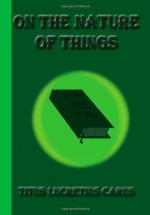|
This section contains 7,651 words (approx. 20 pages at 400 words per page) |

|
Penwill views the ending of Lucretius' Book 6 as a representation of the ending process of life, which leads to an explanation of the abrupt ending.
That Lucretius should choose to end his Epicurean representation of the world with a long and harrowing account of the plague that struck Athens in 430 B.C.E. is certainly one of the more remarkable facts in classical Roman poetry. More remarkable still is the suddenness of the ending. The poem simply breaks off as one critic says 'almost in mid-sentence'; and even if we follow this same critic in tidying up the end by transferring 6.1247-51 to follow 1286 we are still left very much in mediis rebus, with the plague at its height and death and misery all around. Our initial response is one of surprise and puzzlement as we feel cheated of a sense of an ending; this in turn...
|
This section contains 7,651 words (approx. 20 pages at 400 words per page) |

|




